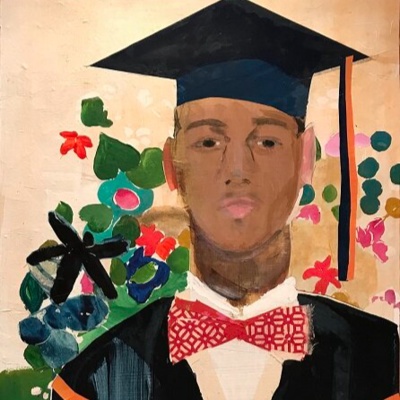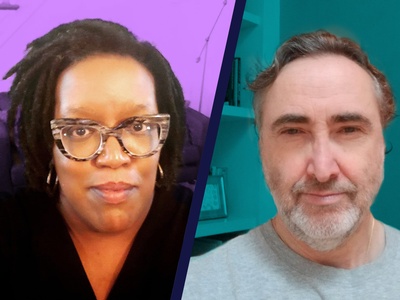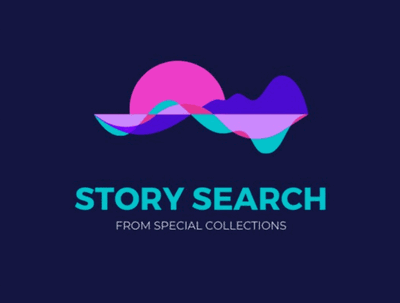Hannah Cho is a University of Pennsylvania Work-Study student from Davis, CA. During the Fall semester, she studied, recorded, and edited the Story Search podcasts remotely from South Korea.
I’ve always been more of a talker rather than a listener. Little did I know that editing hour-long podcasts would teach me the value of listening. Starting in October 2020, I took on a podcast editor position at the Free Library. Called Story Search from Special Collections, the first season of this podcast explores stories based on, inspired by, or connected to material artifacts. My role entailed sitting in for interview recordings, editing the podcasts, and uploading them onto Spotify and Anchor, a site that allows our audience to listen to the show on multiple podcast platforms.
Though I’ve been stuck in quarantine in South Korea since May, it feels like I’ve traveled the world in the past few months. From delving into the story of James Bond in England to learning about labor unions in Philadelphia, I gained so much insight and knowledge from listening to and recording podcast interviews. To gather further perspectives about Story Search from Special Collections, I interviewed hosts Joe Shemtov (Library Coordinator) and Andrea Lemoins (Community Organizer).
Could you introduce the series Story Search from Special Collections? How did it start?
Joe: We had a monthly program called Hands-on History, which is a hands-on program series presented by library staff on a variety of topics. Participants learn about historical artifacts by touching and interacting [with] objects, which heightens their learning experience. When the pandemic hit and we couldn’t have this series anymore, I thought, ‘Hmm, how do I replace that? Is there anything I can do remotely?’ There was something called Virtual Hands-on History—guests would present the objects over Zoom—but I thought that a podcast platform would be better because it would be more conversational and its shelf-life would be a little longer. So, in my mind, that’s what gave birth to the idea of this project. My larger goal now for Special Collections is to engage more people in meaningful ways and to promote the Free Library’s Special Collections while giving voice to community members. Andrea was actually scheduled to be a guest lecturer for Hands-on History, and her topic was on union history. I thought she’d be a great addition to our podcast so I asked her if she would be willing to participate. I was also interested in Andrea because she was outside of Special Collections—instead of two people from Special Collections, we would have someone who’s rooted in community programming.
Andrea: I think Joe pretty much said it all. When Joe reached out to me to see if I’d be interested in doing my hands-on labor program in podcast form, I thought, ‘Yeah, that sounds right up my alley. Let’s do that.’ He started talking about how he wanted to reach out to the neighborhood libraries to really talk about its artifacts and take them out of that Parkway Central Library silo, and that was really important to me. That got my interest. From working in the neighborhood libraries, I know that each one is so unique. They’re unique in the collections that they have, but I don’t think the library system as a whole really focuses on that, but rather leans more on Parkway Central. So, when Joe talked about doing that, I was very interested. So here we are!
J: And I think that’s really a challenge. There’s such a disconnect between what’s going on in privileged areas and the communities the general public are part of. We hope to bridge some of those gaps through this podcast, and I want it to be a place where we can bring up difficult issues and talk about them.
What was the most difficult aspect of hosting this podcast?
J: For me, it was finding someone like you [Hannah]. I’m an ‘ideas’ person, so if I wasn’t a librarian, I would have ended up in an advertising agency. I’m just very creative, but there are two things I’m not good at. It’s hard for me to start things—I still remember the nightmares from having to turn things in during my undergraduate experience—and I couldn’t get the hang of the technical side of the podcast. So, for me, that’s been the greatest challenge. The second one is technical aspects with Zencastr, which is the platform we use to record each episode. It’d be a lot better if we were able to do this in person, but we’ll have to wait and see.
A: I agree with Joe. I had a lot of trouble with figuring out the logistical side of creating this podcast. I thought the idea was great, but I had no idea how to go about it. So, it’s great to have you here, Hannah. Also, Joe and I knew each other before this but establishing our banter online was hard. Each episode is getting better, though, so we can work through those challenges.
On the flip side, what was your favorite part about the podcast?
J: An episode that I remember in particular was the third episode, "Souls Shot Portrait Exhibition: Remembering Lost Lives", which is about an organization / project that connects artists with the families and friends of victims who fell to gun violence. I like how the Logan Library can collaborate with cultural organizations to present programs that are important to the community. Family members were shot down, but that’s not how their families wanted to remember them. I think that it brings out all the good things that a library can do for people. We’re embedded in the community, and I’d love to have [Souls Shot] exhibit their portraits in the Rare Book Department at the Free Library.
A: I like doing community-based research and really thinking about the gifts and artifacts at the libraries. The neighborhood libraries are such crucial cultural centers, and I love looking into them. I’m very excited to get more information out about them with this podcast.
Where do you see this podcast going? What kind of goals do you want to accomplish with it in the future?
J: I want to look at things in greater depth. The objects we talk about can be used to engage communities. I know people involved in this project will eventually move on, but I want to keep this podcast running and make as many as we can. I’ll just have to find the people to help me continue with this.
A: What I think is so beautiful about the potential of this podcast is that the stories discuss topics that are very important to communities in Philadelphia, and I think that libraries have become a center for marginalized people to come together and build political power and community.
 The Real James Bond by Jim Wright
The Real James Bond by Jim Wright  Souls Shot Portrait Painting
Souls Shot Portrait Painting  Holy Quran
Holy Quran Listen to our podcasts to learn more about Story Search from Special Collections and access booklists from our catalog that go in-depth with additional resources related to your favorite episodes!
Have a question for Free Library staff? Please submit it to our Ask a Librarian page and receive a response within two business days.


